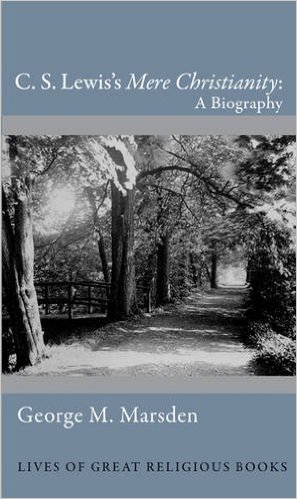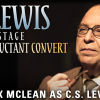I just finished reading a biography about a book. Does that sound odd? It did to me when I first heard about George Marsden’s recent publication C. S. Lewis’s Mere Christianity: A Biography. It’s part of the “Lives of Great Religious Books” series published by Princeton University Press. Other “lives” in the growing series are The Bhagavad-Gita, Calvin’s Institutes, and The Book of Mormon. So you get a sense of the diversity they’re aiming for.
The fact that I devoured the book in just a few hours suggests nerd-dom, to be sure. But I appreciated several insights and enjoyed reliving my first reading of the book that, apart from the Scriptures, played the biggest role in my conversion (as was the case for many, many others, as Marsden so delightfully recounts).
For those of you who may not share my obsession and probably won’t ever read this book about a book, here are a few points you might appreciate:
- Not everyone was a fan of Lewis’s radio broadcasts, which were then transcribed for publication. His academic colleagues at Oxford were embarrassed by his low brow approach to a topic they wished he’d leave for others to address. This cost Lewis the promotion to what we might have in our university systems as something like full professorship.
- Criticism came from beyond the academic world as well. The “usual suspects” included liberal Protestants who dismissed Lewis as a fundamentalist who needed to get in touch with current scholarship about the Bible and religion.
- Some philosophers attacked his work for lack of philosophical sophistication. These critiques continue to this day.
- Thankfully, evangelicals welcomed the book as a potent ally in the proclamation of the gospel to thoughtful seekers who did not find resonance with other less-intellectually-rigorous approaches. Even though the Oxford Don smoked, drank, and did not affirm inerrancy, influential evangelicals such as Wheaton’s Clyde Kilby saw benefits that far outweighed any liabilities.
Marsden’s seven reasons for “The Lasting Vitality of Mere Christianity” are worth listing here for consideration and imitation:
- Lewis looks for timeless truths as opposed to the culturally bound.
- He uses common human nature as the point of contact with his audiences.
- Lewis sees reason in the context of experience, affections, and imagination.
- He is a poet at heart, using metaphor and the art of meaning in a universe that is alive.
- Lewis’s book is about “mere Christianity.” (“the belief that has been common to nearly all Christians at all times.”)
- Mere Christianity does not offer cheap grace.
- The lasting appeal of Mere Christianity is based on the luminosity of the Gospel message itself.
One last thought: I was challenged by a comment Lewis wrote in a letter about his role as an apologist, recorded by Marsden. “People praise me as a ‘translator’, but what I want is to be the founder of a school of translation…I am nearly forty-seven. Where are my successors?”
I commend the book about the book. More important, I commend the task of “translating” the message of the gospel to thoughtful people around us. They might respond well to reading the book that many consider the most important Christian work of the twentieth century.



